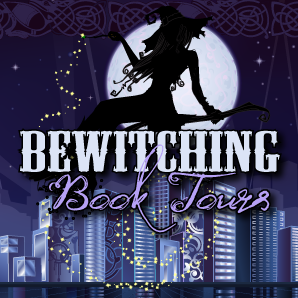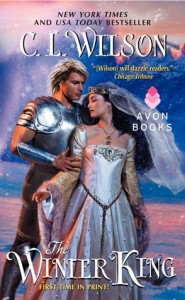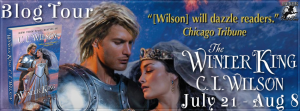Today, I’d like to welcome C.L. Wilson, who recent published The Winter King (reviewed here).
Putting the Character in Characters
by C.L. Wilson

One of the best things about writing fantasy romance (besides the worldbuilding, which I adore) is the freedom you have to create wildly unique and interesting characters to populate your world. In fiction—especially fantasy fiction—larger-than-life qualities often make for the most interesting characters.
Unbound by conventional mores, laws, or even realities, fantasy characters can be literally larger than life: immortal, magical, world-endingly dangerous, you name it. It’s part of what makes reading such a thrill ride. You can enjoy the danger from the safety of your armchair, and you can explore all manner of provocative “what if” scenarios without having your suspension of disbelief destroyed.
For example, in one of my absolute favorite recent reads, Heart of Obsidian, phenomenally talented Nalini Singh created a character (Kaleb Krychek) who is a telekinetic so powerful, he can literally rip the world apart, and so tortured he will use that power without remorse if anything happens to the one and only person he cares about. He is a self-admitted sociopath, devoid of empathy and teetering on the brink of insanity, who has killed people before, driven others insane, and will “line the street with bodies” to protect his one love. In real life, someone like Kaleb would send most women running the other way, screaming in terror (and rightfully so), yet through the course of the novel, Nalini not only helps her readers and heroine understand him, she makes us fall irrevocably and eternally in love with him. Yes, unashamedly, I ♥ Kaleb Krychek.
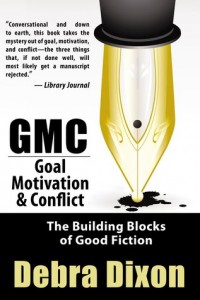 So how do you go about building characters that will grip a reader’s attention and rouse their emotions? For me, it all starts with the basic building blocks of fiction: Goal, Motivation and Conflict. Or, more simply put, what does this character want, why does s/he want it, and why can’t s/he have it? (There’s a fabulous book on Goal, Motivation, and Conflict by Debra Dixon called, wait for it, GMC: Goal, Motivation & Conflict, which I highly recommend to all writers.) Understanding both the external (material/worldly) and internal (emotional) GMC of my characters is the point from which I begin developing every character I write (walk-ons excluded, of course). Because in order to answer the question of GMC, you have to understand where you character comes from, what they value most, what their greatest strengths and weaknesses are, and what is the source of their pain (ie, you need to understand and build their backstory).
So how do you go about building characters that will grip a reader’s attention and rouse their emotions? For me, it all starts with the basic building blocks of fiction: Goal, Motivation and Conflict. Or, more simply put, what does this character want, why does s/he want it, and why can’t s/he have it? (There’s a fabulous book on Goal, Motivation, and Conflict by Debra Dixon called, wait for it, GMC: Goal, Motivation & Conflict, which I highly recommend to all writers.) Understanding both the external (material/worldly) and internal (emotional) GMC of my characters is the point from which I begin developing every character I write (walk-ons excluded, of course). Because in order to answer the question of GMC, you have to understand where you character comes from, what they value most, what their greatest strengths and weaknesses are, and what is the source of their pain (ie, you need to understand and build their backstory).
We are all creatures of both nurture and nature. We are born with certain gifts, physical qualities, aptitudes, temperaments, etc. But on an emotional level, who we become is heavily influenced by nurture: the environment we are raised in, the friendships we form, the culture we grow up in, the battles we win and lose, etc. It’s that emotional past (that baggage) as well as natural abilities that combine to make interesting, complex people in real life and fascinating, truly compelling characters on the pages of a book.
I always, when fleshing out a character, look for sources of conflict that can arise from their abilities, their past experiences, their current desires and fears.
Some of the questions I ask when fleshing out a character:
- What is the person’s greatest strength? What does that person do best, or what is the strongest element of their character. Often, that greatest strength is also the characters greatest weakness. For instance, a fantasy character’s greatest strength might be empathy—the ability to sense the feelings of others, so you can tell when someone is lying, afraid, nervous, etc. But then the character’s greatest weakness might be that they are physically defenseless, because any pain they deal another doubles back on them. Or the person with ESP who can read thoughts—a great strength—who has no friends because no one wants their real thoughts laid bare to another person.
- What is the person’s greatest weakness? (for ideas, see above) Yes, every character must have a weakness, and it must be a good one. Even Superman has his Kryptonite. An invincible character does not make for fascinating reading. Now, nearly invincible on the other hand…that can be lots of fun to read and write about.
- What does this person love/value most? What will s/he do to get it/protect it/keep it? (This often speaks to either Goal and/or Motivation in a story)
- What is this person’s greatest source of pain? What is their Wound (capitalization intended)? The deep emotional scar or longing. The pain this person doesn’t want to face again (and, of course, the story will force the character to face that pain). This is the core emotional Conflict (the C of GMC) of the story, and it’s closely linked to the transformation the character will need to undergo, the growth s/he’ll need to make in order to triumph in the end.
Finally, in fiction, more can often be better. More power, more angst, more pain, more at stake, more, more, more. Genre fiction readers don’t read for blah, everyday characters (unless said character is caught up in some extremely NOT-everyday events, and has to rise to the occasion to deal with it). We all get up, put our clothes on, go to work, raise our families, rinse, repeat. We might have fights at the office, get stuck in traffic, glare at the rude person who jumps in front of little old ladies in the grocery store line, but lives like that don’t make for page-turning fiction.
I’m not saying your character should be the most gifted, the most beautiful, the most everything. I would hate that character, and such a character would probably destroy my suspension of disbelief in a story. But it is the unique, fantastic, even extreme qualities of fictional characters and their situations that grab our interest on the page.
And it is those larger-than-life qualities that make for compelling characters and page-turning novels.
 About C. L. Wilson
About C. L. WilsonPraised for exceptional worldbuilding and lyric prose, C.L. Wilson’s unique blend of action, romance, and richly-imagined fantasy have endeared her books romance and fantasy readers alike. Her critically acclaimed novels have regularly appeared on bestseller lists including the USA Today, the New York Times, and Publisher’s Weekly.
When not torturing her characters mercilessly, C.L. enjoys reading, questing through the wilds of the latest Elder Scrolls game and dreaming of a world where Bluebell’s Nutty Chocolate ice cream is a fat burning food.
Her newest novel, The Winter King, is available anywhere books are sold. She can be found online at www.clwilson.com.
~~~~~~TOURWIDE GIVEAWAY~~~~~~
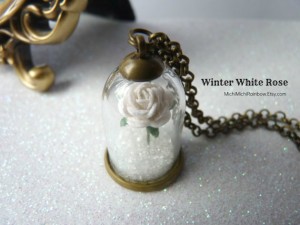
C.L. is giving away copy of The Winter King, complete with a gorgeous white rose snow globe pendant reminiscent of the book!
Open to US Shipping
